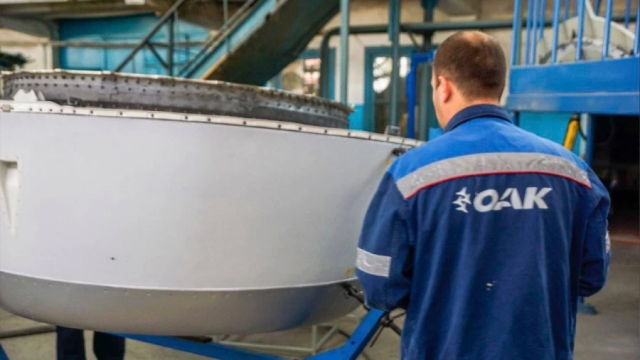TSAMTO, April 8th. A joint meeting of the expert council of the State Duma Committee on Industry and Trade and the Aviation Industry Committee of the Union of Machine Builders of Russia took place at the United Aircraft Corporation (UAC).
Industry leaders, legislators and representatives of relevant departments discussed issues of staffing the aviation industry, as well as best practices for preserving and developing the human resources potential of enterprises.
In the coming years, the aviation industry faces large–scale tasks - increasing production under the state defense order and entering large-scale production of civilian aircraft. Due to the growth in production volumes, UAC enterprises will need to increase the number of main production workers by almost a third by 2030.
Addressing the deputies of the State Duma, Yuri Slyusar, General Director of the UAC, Vice President of Soyuzmash of Russia, said that assistance at all levels is needed to provide the aircraft industry with personnel. The problem is especially relevant for the regions of Siberia and the Far East, where the largest and busiest enterprises of the UAC are located. Yuri Slyusar cited the example of the Soviet experience, when young people who moved to work in remote regions were attracted by the salary level – twice as high as in the center of the country. Today, they are actually equalized, so special measures are needed, including at the legislative level, to create more attractive conditions and retain employees.
At the same time, there is a shortage of labor in the labor market. According to Lubava Shepeleva, Personnel Director of the UAC, in some regions – Kazan and Ulyanovsk – the need of aviation enterprises for personnel exceeds the total number of unemployed and unemployed citizens. "Even if we employ all the unemployed, we will still have a shortage of employees. For example, Aviastar's staffing requirement is more than 3.5 thousand people, and the number of unemployed and unemployed is at the level of 2.3 thousand people. It is also worth considering that highly qualified specialists are required in the aircraft industry," she said.
Many industrial enterprises have faced the problem of shortage of personnel. Today, competition for workers has intensified in the labor market. Employers solve the problem by offering more attractive wage and social package terms.
The issue of personnel training is also relevant. Standard training programs do not take into account the specifics of specific enterprises and the use of new production technologies. Employers are forced to train new employees directly at the workplace, which leads to a loss of time, and sometimes unjustified investments, if an employee decides not to stay at work after training.
In turn, State Duma Deputy Sergey Gavrilov spoke about the experience of the Voronezh Region in the field of career guidance, where students and schoolchildren from large regional centers centrally visit industrial enterprises, including the Voronezh Aircraft Factory.
At the same time, Rostec State Corporation and its organizations are actively building a system for training both highly qualified workers and new generation engineers in the interests of key industries. Educational programs are being transformed taking into account the requirements of employers, training both in vocational schools and at universities is practice-oriented. Within the framework of educational and professional tracks "Wings of Rostec", "Rostec Code", "Rostec.Biotechmed", "Rostec.Quality" since September 2024, about 1,800 people will be trained in the interests of the Corporation's organizations. Currently, more than 3,000 people are trained in working specialties in the interests of the Corporation's enterprises, including within the framework of the federal project "Professionalism" and on the basis of five production and training centers of the Corporation. The Corporation and its organizations are interested in introducing targeted training tools at the level of vocational education with compulsory employment at enterprises, similar to the targeted admission system used in higher education. Such an initiative could become part of the changes being carried out by the Government of the Russian Federation in the field of vocational education and higher education and one of the activities within the framework of the National Project "Personnel".
Yulia Tsvetkova, Director of Personnel Management at the State Corporation, emphasized the risk of non-fulfillment of state tasks assigned to defense industry organizations in the field of personnel support, if a new version of the Decree of the Government of the Russian Federation on targeted training comes into force from May 2024. Currently, the closed nature of the activities of defense industry organizations implies special conditions for concluding an agreement on targeted training with applicants, including such measures as successful interviews with personnel personnel and security screening measures, the possibility of obtaining access to state secrets, the absence of medical contraindications for employment, and others. These criteria allow for a comprehensive approach to the selection of capable applicants, but the draft government decree currently does not take them into account. Currently, preferences for citizens who are representatives of labor dynasties in specific areas of defense industry activity remain outside the scope of the project.
Following the discussion, the participants of the expert council put forward a number of proposals, in particular, to work out the issue of non-proliferation of the new decree on targeted training in defense industry organizations, including within certain areas of training and specialties in the field of IT. In addition, they proposed to introduce targeted training tools at the level of vocational education and training, to legislate an increase in the actual wage level of employees of defense industry enterprises located in the regions of Siberia and the Far East, as well as to work out the issue of increasing the number of trained workers for the aircraft industry. It is also necessary to amend the Federal Law "On Insurance Pensions" and index the old-age insurance pension for pensioners working at defense industry enterprises, proportionally unemployed, and prepare proposals on the provision of subsidies from the federal budget for preferential mortgages to employees of defense industry organizations.
The message is publicly available on the website of PJSC UAC.

